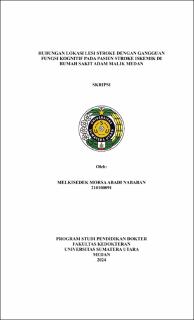| dc.description.abstract | Background. Ischemic stroke is a condition where blood vessels in the brain are blocked. This disease is one of the leading cause of death worldwide. Characteristics of stroke such as severity, recurrence, volume, and lesion location are factors that cause cognitive function disorders. Cognitive function examination in post-stroke patients is important because it affects quality of life and mortality rates. Objective. To analyze the relationship between stroke lesion location and cognitive function disorders in outpatients at Adam Malik Hospital Medan in 2024. Methods. This study is an observational analytical research with a cross-sectional design. The research sample consists of ischemic stroke patients, selected using consecutive sampling. The sample size was determined using the Lemeshow formula, requiring a minimum of 41 samples. The data used includes primary data from MoCA-Ina questionnaire interviews and secondary data from patient medical records. The analysis used is univariate and bivariate analysis with Chi-Square. Results. Out of 47 patients, 36 patients (76,7%) experienced cognitive function disorders, while 11 patients (23,4%) did not. There were 25 patients (69,44%) with lesions in the left hemisphere, while 11 patients (30,56%) had lesions in the right hemisphere. Statistical analysis showed a relationship between stroke lesion location and cognitive function disorders based on MoCA-Ina with a p value <0,001, an odds ratio (OR) of 22,727, and a 95% confidence interval (CI) of 2,583 – 199,96151. Conclusion. There is a significant relationship between stroke lesion location and cognitive function disorders in post-ischemic stroke patients based on MoCA-Ina. | en_US |


